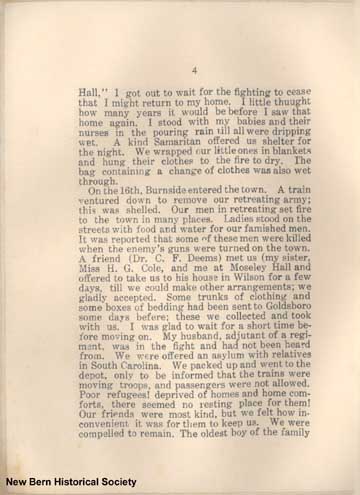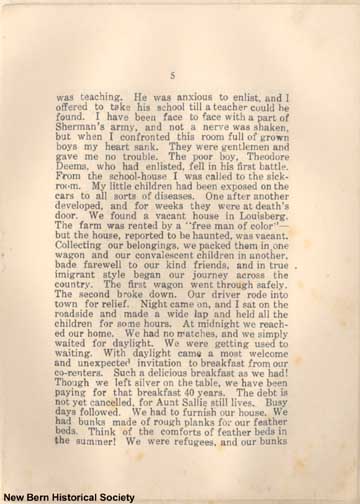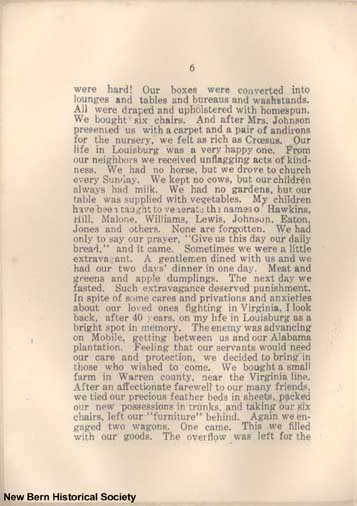
Historical Incidents by Mrs. F.C. Roberts,
Part 2
Click on the page images to view a more detailed image.
 |
4 Hall,” I got out to wait for the fighting to cease that I might return to my home. I little thuught how many years it would be before I saw that home again. I stood with my babies and their nurses in the pouring rain till all were dripping wet. A kind Samaritan offered us shelter for the night. We wrapped our little ones in blankets and hung their clothes to the fire to dry. The bag containing a change of clothes was also wet through. On the 16th, Burnside entered the town. A train ventured down to remove our retreating army; this was shelled. Our men in retreating set fire to the town in many places. Ladies stood on the streets with food and water for our famished men. It was reported that some of these men were killed when the enemy's guns were turned on the town. A friend (Dr. C.F. Deems) met us (my sister, Miss H.G. Cole, and me at Moseley Hall and offered to take us to his house in Wilson for a few days, till we could make other arrangements; we gladly accepted. Some trunks of clothing and some boxes of bedding had been sent to Goldsboro some days befere; these we collected and took with us. I was glad to wait for a short time before moving on. My husband, adjutant of a regiment, was in the fight and had not been heard from. We were offered an asylum with relatives in South Carolina. We packed up and went to the depot, only to be informed that the trains were moving troops, and passengers were not allowed. Poor refugees! deprived of homes and home comforts, there seemed no resting place for them! Our friends were most kind, but we felt how inconvenient it was for them to keep us. We were compelled to remain. The oldest boy of the family |
||
 |
5 was teaching. He was anxious to enlist, and I offered to take his school till a teacher could he found. I have been face to face with a part of Sherman's army, and not a nerve was shaken, but when I confronted this room full of grown boys my heart sank. They were gentlemen and gave me no trouble. The poor boy, Theodore Deems, who had enlisted, fell in his first battle. From the school-house I was called to the sickroom. My little children had been exposed on the cars to all sorts of diseases. One after another developed, and for weeks they were at death's door. We found a vacant house in Louisberg. The farm was rented by a "free man of color"--but the house, reported to he haunted, was vacant. Collecting our belongings, we packed them in one wagon and our convalescent children in another, bade farewell to our kind friends, and in true imigrant style began our journey across the country. The first wagon went through safely. The second broke down. Our driver rode into town for relief. Night came on, and I sat on the roadside and made a wide lap and held all the children for some hours. At midnight we reached our home. We had no matches, and we simply waited for daylight. We were getting used to waiting. With daylight came a most welcome and unexpected invitation to breakfast from our co-renters. Such a delicious breakfast as we had! Though we left silver on the table, we have been paying for that breakfast 40 years. The debt is not yet cancelled, for Aunt Sallie still lives. Busy days followed. We had to furnish our house. We had bunks made of rough planks for our feather beds. Think of the comforts of feather beds in the summer! We were refugees, and our bunks
|
||
 |
6 were hard! Our boxes were converted into lounges and tables and bureaus and washstands. All were draped and upholstered with homespun. We bought six chairs. And after Mrs. Johnson presented us with a carpet and a pair of andirons for the nursery, we felt as rich as Croesus. Our life in Louisburg was a very happy one. From our neighbors we received unflagging acts of kindness. We had no horse, but we drove to church every Sunday. We kept no cows, but our children always had milk. We had no gardens, but, our table was supplied with vegetables. My children have been taught to venerate the names of Hawkins, Hill, Malone, Williams, Lewis, Johnson, Eaton, Jones and others. None are forgotten. We had only to say our prayer, “Give us this day our daily bread,” and it came. Sometimes we were a little extravagant. A gentlemen dined with us and we had our two days’ dinner in one day. Meat and greens and apple dumplings. The next day we fasted. Such extravagance deserved punishment. In spite of some cares and privations and anxieties about our loved ones fighting in Virginia, I look back, after 40 years, on my life in Louisburg as a bright spot in memory. The enemy was advancing on Mobile, getting between us and our Alabama plantation. Feeling that our servants would need our care and protection, we decided to bring in those who wished to come. We bought a small farm in Warren county, near the Virginia line. After an affectionate farewell to our many friends, we tied our precious feather beds in sheets, packed our new possessions in trunks, and taking our six chairs, left our “furniture” behind. Again we engaged two wagons. One came. This we filled with our goods. The overflow was left for the
|
||
| Pages 1 through 3 | Pages 4 through 6 | Pages 7 through 9 | Pages 10 through 12 |
| Pages 13, 14 and end pages | |||
Return to:
Craven County Digital History Exhibit
Return to: New Bern Historical Society Section of
Digital History Exhibit
Return to:
Kellenberger Room
Images scanned by John B. Green, III. Text prepared by
John B. Green, III and Victor T. Jones, Jr.
This page last edited on
August 21, 2018.



